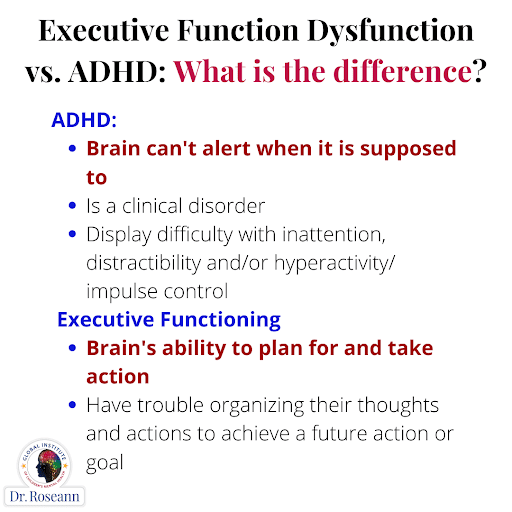So what is the difference between ADHD and executive functioning dysfunction? Well, that is something a lot of parents and professionals don’t fully understand. Many ask…
“Does every child or teen with executive functioning difficulties have ADHD?” NO.
“Does every child or teen with ADHD have executive functioning difficulties?” Yes.
“Say what, Dr. Ro?” you may ask. Well, let’s dive into the differences between ADHD and executive functioning dysfunction so you can get a better understanding of what is going on with your child.
ADHD vs. Executive Functioning Dysfunction
Before we discuss ADHD as a clinical condition, it is important to understand what attention is and what are executive functions. Simply, attention is the brain’s ability to alert when it is supposed to and executive function is the brain’s ability to plan and take action. Ah ha moment here!
Both skills are separate but you need both skills to be successful with managing all sorts of tasks in everyday life. If you aren’t alert, then you will constantly miss directions, especially verbal directions. Kids with attention issues often process words on a delay because they aren’t alerting in a timely manner and typically have a three to five second delay before they even recognize someone is speaking to them. That is a long time to miss information and means they are always playing catch-up. It also explains why you are repeating yourself over and over only to get a, “huh” or “what” back. So frustrating!
Executive functions, on the other hand, are a set of mental skills that help one organize their thinking and actions for a future action or goal. It is those strategic planning skills that help you see that future goal and work towards it. We all know people who are really good at having a vision of what they want to and then create an action plan around it and those are people with good executive functioning skills.

What are Good Executive Functioning Skills and How They Help Kids With ADHD
Kids with ADHD lack good executive functioning. Their distractibility, inattentiveness or impulsivity interfere with their ability to start and complete tasks. Independent strategic planning is an immature skill because of their very immature attention. If you aren’t paying attention, then how can you know what to do now, let alone in the future… you can’t.
Kids with good executive functioning skills have good self awareness and awareness about the things and people in their environment. They can connect what they are doing and what actions they need to take with the environment around them without needing much adult guidance or support. They have that internal awareness about what steps to take and in what order to get a task done in a timely manner.
Understanding what ADHD is and how ADHD is diagnosed is also imperative for parents to help their kids who struggle with attentional issues and ADHD and help you see your child’s assets and how they can boost their strengths. ADHD is a clinical condition that appears before age seven and a child displays inattention, distractibility and/or hyperactivity and impulsivity. These difficulties are significant and impact them at school, home or other environments.
Why is There an Increase in Attention and Executive Functioning Problems in Kids?
One of the most common questions I get from journalists and parents is, “Why do so many kids today struggle with attention and is it because we are better at identifying them?” To answer the later part of this question first, no we aren’t better at identifying kids with ADHD there is just an increase in ADHD amongst kids.
According to an article in JAMA in 2018, ADHD has increased in estimated prevalence among U.S. children and adolescents from 6.1% to 10.2% between 1997 and 2016. One can only imagine how many more kids were diagnosed with ADHD during the pandemic with a rise in so many mental health issues in general.
So why such an increase in the diagnosis of ADHD and executive functioning issues? IAS I talk about in-depth in my book, “It’s Gonna Be OK!”, there isn’t any one factor and instead several occurring at the same time.
Reasons Why Kids Struggle With Executive Functioning and Attention
- Lack of play: children learn visualization skills through imaginative free play
- Too much media and not enough physical, hands-on activities (no surprise!)
- Lack of metacognitive skills
- Lack of situational awareness and alertness to their surroundings
- Shift toward checklists and parents doing too much for their kids
- A trend toward “bubble wrap” parenting and a lack of autonomy in kids
Kids with attention and executive functioning issues, don’t have that internal dialogue that organizes their thinking. They aren’t running through a list of things they need for a project because their brain isn’t wired that way. That lack of inner dialogue leads to poor working memory, which is a key factor in moving information into a long-term memory.
There is something one can do to build executive functioning skills when you work with one of our coaches and use our EF ACTION PLAN™ and help to regulate the brain at the same time with neurofeedback at home. Our BrainBehaviorReset™ Method involves the combination of calming and regulating the brain paired with the learning of new EF skills to help children and teen to gain those indispensable skills.
Always remember… “Calm Brain, Happy Family™”
Disclaimer: This article is not intended to give health advice and it is recommended to consult with a physician before beginning any new wellness regime.
Always remember… “Calm Brain, Happy Family™”
Are you looking for SOLUTIONS for your struggling child or teen?
Dr. Roseann and her team are all about solutions, so you are in the right place!
There are 3 ways to work with Dr. Roseann:
You can get her books for parents and professionals, including: It’s Gonna Be OK™: Proven Ways to Improve Your Child’s Mental Health, Teletherapy Toolkit™ and Brain Under Attack: A Resource For Parents and Caregivers of Children With PANS, PANDAS, and Autoimmune Encephalopathy.
If you are a business or organization that needs proactive guidance to support employee mental health or an organization looking for a brand representative, check out Dr. Roseann’s media page and professional speaking page to see how we can work together.
Dr. Roseann is a Children’s Mental Health Expert and Therapist who has been featured in/on hundreds of media outlets including, CBS, NBC, FOX News, PIX11 NYC, The New York Times, The Washington Post,, Business Insider, USA Today, CNET, Marth Stewart, and PARENTS. FORBES called her, “A thought leader in children’s mental health.”

She is the founder and director of The Global Institute of Children’s Mental Health and Dr. Roseann Capanna-Hodge. Dr. Roseann is a Board Certified Neurofeedback (BCN) Practitioner, a Board Member of the Northeast Region Biofeedback Society (NRBS), Certified Integrative Medicine Mental Health Provider (CMHIMP) and an Amen Clinic Certified Brain Health Coach. She is also a member of The International Lyme Disease and Associated Disease Society (ILADS), The American Psychological Association (APA), Anxiety and Depression Association of America (ADAA) National Association of School Psychologists (NASP), International OCD Foundation (IOCDF) International Society for Neurofeedback and Research (ISNR) and The Association of Applied Psychophysiology and Biofeedback (AAPB).
© Roseann-Capanna-Hodge, LLC 2023
Disclaimer: This article is not intended to give health advice and it is recommended to consult with a physician before beginning any new wellness regime. *The effectiveness of diagnosis and treatment vary by patient and condition. Dr. Roseann Capanna-Hodge, LLC does not guarantee certain results.













